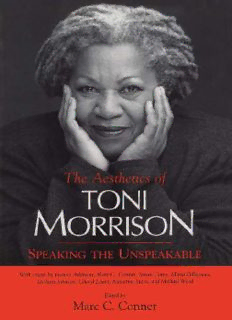
The Aesthetics of Toni Morrison: Speaking the Unspeakable PDF
Preview The Aesthetics of Toni Morrison: Speaking the Unspeakable
The Aesthetics of TONI MORRISON This page intentionally left blank The Aesthetics of TON I MORRISON SPEAKING THE UNSPEAKABLE Edited by Marc Q Conner University Press of Mississippi Jackson To my parents www.upress.state.ms.us Copyright © 2000 by University Press of Mississippi All rights reserved Manufactured in the United States of America 08 07 06 05 04 03 02 432 00 Library of Congress Cataloging-in-Publication Data The aesthetics of Toni Morrison : speaking the unspeakable / edited and with an introduction by Marc C. Conner. p. cm. Includes bibliographical references and index. ISBN 1*57806*284*5 (alk. paper) — ISBN 1-57806-285-3 (pbk.: alk. paper) 1 . Morrison, Toni—Criticism and interpretation. 2. Afro-American aesthetics. 3. Aesthetics in literature. 4. Afro-American women in literature. 5. Narration (Rhetoric). I. Reyes-Conner, Marc Cameron, 1963- PS3563.O8749 Z53 2000 813'.54—dc21 00-021405 British Library Cataloging-in-Publication Data available CONTENTS Acknowledgments vii Introduction: Aesthetics and the African American Novel ix "Aesthetic" and "Rapport" in Toni Morrison's Sula 3 Barbara Johnson Language That Bears Witness: The Black English Oral Tradition in the Works of Toni Morrison 12 Yvonne Atkinson Toward the Limits of Mystery: The Grotesque in Toni Morrison's Beloved 31 Susan Corey From the Sublime to the Beautiful: The Aesthetic Progression of Toni Morrison 49 MarcC. Conner Toni Morrison's Beauty Formula 77 Katherine Stern Contentions in the House of Chloe: Morrison's Tar Baby 92 Maria DiBattista Sensations of Loss 113 Michael Wood Meditations on a Bird in the Hand: Ethics and Aesthetics in a Parable by Toni Morrison 125 Cheryl Lester Works Cited 139 Contributors 149 Index 151 ACKNOWLEDGMENTS This book has been encouraged and advised by a number of people to whom I am quite grateful. Arnold Rampersad, Michael Kowalewski, Eric Sundquist, and Lee Mitchell each gave helpful guidance at various stages of this project. The Works-in-Progress group at Washington and Lee University offered sub- stantive comments on the introduction. Seetha Srinivasan and the Univer- sity Press of Mississippi have been very supportive of this project, and helped give the book its final shape. The libraries of Princeton University, the Uni- versity of Notre Dame, the University of Virginia, and Washington and Lee University have been consistently helpful. Generous support from the Glenn Grant Foundation at Washington and Lee helped fund much of this project. I am profoundly grateful to Laura Quinney, William Gleason, Henry Weinfield, and Maria DiBattista, who have shaped my thinking on issues of aesthetics and literary works in crucial ways. The best parts of this book certainly bear their imprint. Finally, each of the contributors to this book has taught me so much about Morrison's writing and its aesthetic implications. To be sure, with- out their efforts this book would not exist. Few writers are as aware of the debts owed to ancestors as is Toni Morrison. This book is dedicated to my parents, and to the sense of family they have bequeathed to me. And to my wife Barbara, and our two sons Matthew and Noah, I offer grateful thanks for their support, patience, and steadying good humor. vii This page intentionally left blank INTRODUCTION Aesthetics and the African American Novel MarcC. Conner "For who shall describe beauty? What is it?" W. E. B. Du Bois, "Criteria of Negro Art," 1926 "There is something irresistibly displaced and marginal about the now common and limiting phrase 'aesthetic considerations.'" Raymond Williams, Keywords, 1976 "The discussion of black literature in critical terms is unfailingly sociology and almost never art criticism." Toni Morrison, "Memory, Creation, Writing," 1984 In "The World and the Jug," Ralph Ellison's powerful meditation upon the roles of aesthetics and politics in the African-American novel, Ellison makes a key distinction: "The novel," he urges, "is always a public gesture, though not necessarily a political one." Few American authors have been more aware than Ellison of the unyielding connections between the work of art and life as it is lived, that is, between the aesthetic and the political realms. Indeed, Ellison insists that the African-American writer must engage "the orig- inal American ideals of social and political justice." Yet Ellison's distinction suggests that the novel, while necessarily political, is not only political, and those who view the novel as only a political tool reduce it to something quite other than a work of art. Such critics, Ellison asserts, "should abandon litera- ture for politics" (Ellison, no, 112). ix
Description: